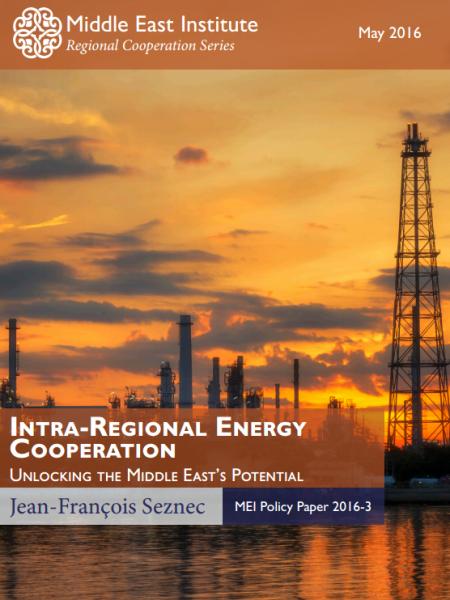Regional Cooperation Series
This Policy Paper is part of The Middle East Institute's Regional Cooperation Series. Throughout 2016, MEI will be releasing several policy papers by renowned scholars and experts exploring possibilities to foster regional cooperation across an array of sectors. The purpose is to highlight the myriad benefits and opportunities associated with regional cooperation, and the high costs of the continued business-as-usual model of competition and intense rivalry.
Summary
Given the vast quantity of energy resources in the Middle East and North Africa, the level of wealth distributed among most in the region is surprisingly low. The region has failed to harness its natural resource wealth to reach its full potential. Instead of cooperating to enhance the economic and industrial prowess of the region, the majority of energy-rich states have pursued a go-it-alone approach in developing their energy-export capabilities, and have mostly targeted markets outside the region. Energy expert Jean-François Seznec argues that intra-regional energy cooperation is a sorely missing aspect in the Middle East and North Africa, costing the region in terms of its economic potential. Identifying partners within the region for the trade and production of oil, natural gas, minerals, and industrial goods has the potential to reduce production costs and maximize benefits for all countries in the Middle East.
Key Points
- There has been very little regional cooperation on mutually beneficial energy relations, even in the richest areas of the Middle East
- Many attempts at energy cooperation between MENA countries have been derailed by geopolitical rivalries
- Remittances and other benefits of economic growth in the Gulf states have been too limited to make a significant impact on the welfare of other countries in the region
- There exist ample opportunities for mutually beneficial energy cooperation between Morocco and Algeria, Qatar and Saudi Arabia, and Iran and the G.C.C. that, if realized, could result in significant economic benefits for all parties
- Energy cooperation presents an opportunity for the countries of the Middle East to forge new partnerships and take steps toward resolving the historical differences currently inhibiting peace and prosperity
The Middle East Institute (MEI) is an independent, non-partisan, non-for-profit, educational organization. It does not engage in advocacy and its scholars’ opinions are their own. MEI welcomes financial donations, but retains sole editorial control over its work and its publications reflect only the authors’ views. For a listing of MEI donors, please click here.














